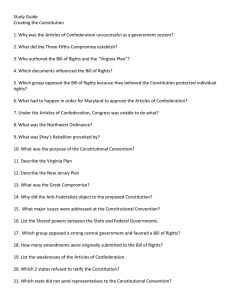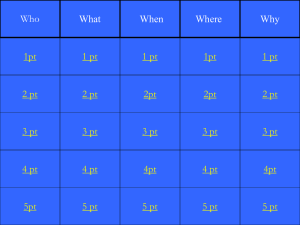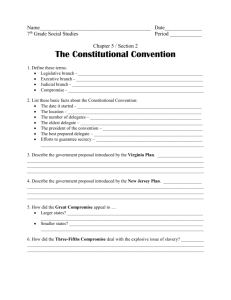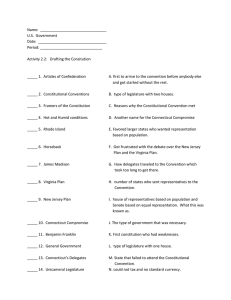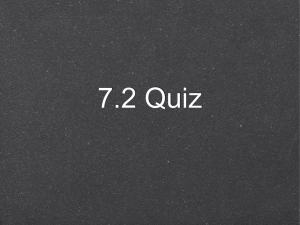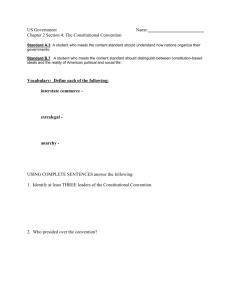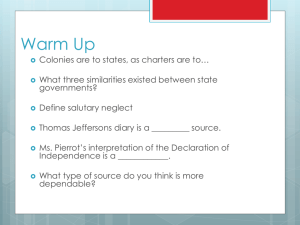The Constitution
advertisement
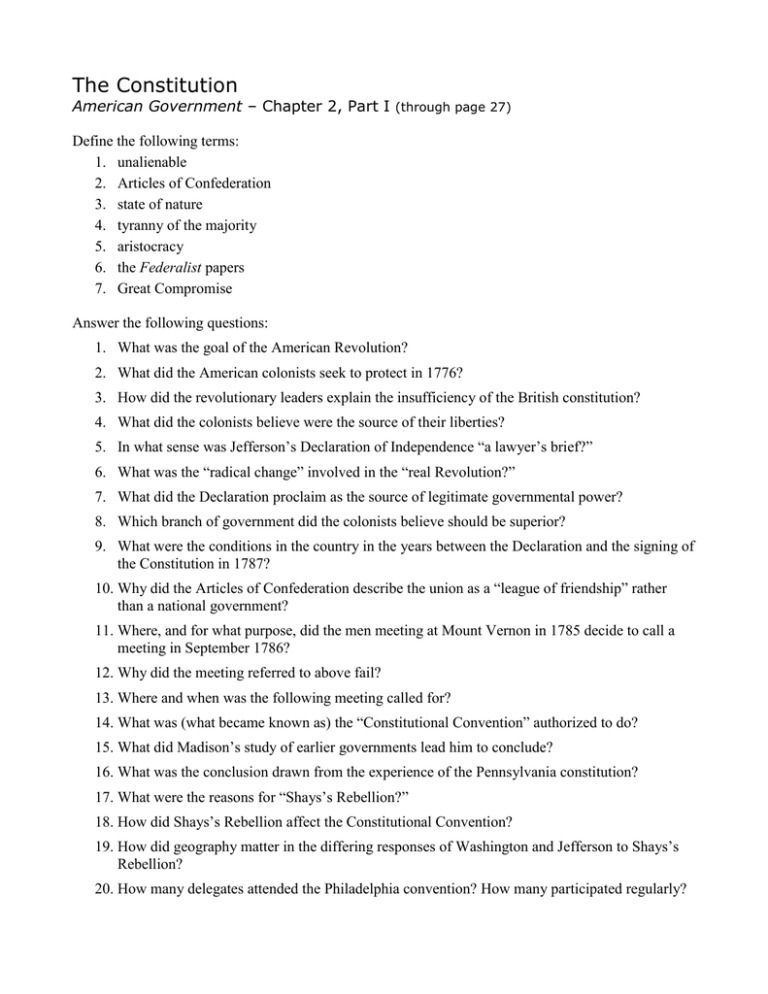
The Constitution American Government – Chapter 2, Part I (through page 27) Define the following terms: 1. unalienable 2. Articles of Confederation 3. state of nature 4. tyranny of the majority 5. aristocracy 6. the Federalist papers 7. Great Compromise Answer the following questions: 1. What was the goal of the American Revolution? 2. What did the American colonists seek to protect in 1776? 3. How did the revolutionary leaders explain the insufficiency of the British constitution? 4. What did the colonists believe were the source of their liberties? 5. In what sense was Jefferson’s Declaration of Independence “a lawyer’s brief?” 6. What was the “radical change” involved in the “real Revolution?” 7. What did the Declaration proclaim as the source of legitimate governmental power? 8. Which branch of government did the colonists believe should be superior? 9. What were the conditions in the country in the years between the Declaration and the signing of the Constitution in 1787? 10. Why did the Articles of Confederation describe the union as a “league of friendship” rather than a national government? 11. Where, and for what purpose, did the men meeting at Mount Vernon in 1785 decide to call a meeting in September 1786? 12. Why did the meeting referred to above fail? 13. Where and when was the following meeting called for? 14. What was (what became known as) the “Constitutional Convention” authorized to do? 15. What did Madison’s study of earlier governments lead him to conclude? 16. What was the conclusion drawn from the experience of the Pennsylvania constitution? 17. What were the reasons for “Shays’s Rebellion?” 18. How did Shays’s Rebellion affect the Constitutional Convention? 19. How did geography matter in the differing responses of Washington and Jefferson to Shays’s Rebellion? 20. How many delegates attended the Philadelphia convention? How many participated regularly? 21. What state refused to send a delegate to the Philadelphia convention? 22. Philadelphia is about 50 miles inland from the Atlantic Ocean. What was the weather like in the summer of 1787? 23. Why do you suppose the delegates to the Philadelphia convention voted to keep the windows closed? 24. What kind of men were delegates to the Philadelphia convention (age, experience, wealth)? 25. Why were the following men absent from Philadelphia: Jefferson, John Adams, Samuel Adams, Patrick Henry? 26. How did the Philadelphia convention exceed its authority? 27. How did the writings of John Locke affect the shaping of the new Constitution? 28. How did Madison, writing in the Federalist, put the problem? 29. Who was president of the Philadelphia convention? 30. How did the introduction of “The Virginia Plan” change the course of the Philadelphia convention? 31. Who was the primary author of “The Virginia Plan?” 32. Did the Virginia Plan contemplate a renewed confederacy or a true national government? 33. How did the Virginia Plan organize the governmental branches? 34. What concerned the representatives of the “small states?” 35. Why was the New Jersey Plan not as influential as the Virginia Plan? 36. Who proposed that each day begin with a prayer? [Franklin wanted the suggestion to provide reflection on the mission of the delegates and inspire humility. Hamilton’s “foreign aid” comment was certainly tongue-in-cheek, but a greater concern was that observers would take the hiring of a clergyman as a sign of desperation.] 37. What was proposed in the Great Compromise (which was almost certainly proposed by Franklin)? 38. What were the two positions on the selection of the president and what was the compromise? 39. Who was the chief draftsman of the final constitutional document in the Committee of Detail? 40. On what date was the Constitution finally approved? Please complete the two charts on page three of this document! Weaknesses of The Articles of Confederation Weakness Constitutional remedy 1 2 3 4 5 6 7 8 9 10 Comparing the Virginia and New Jersey Plans Virginia Plan # houses in legislature lower house, representation by upper house, representation by lower house, how chosen upper house, how chosen executive, how chosen judiciary, how chosen veto of national laws, how veto of state laws, how New Jersey Plan 1 by the executive none none
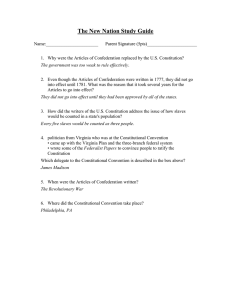
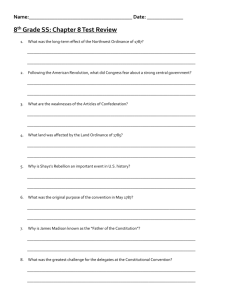
![Quiz About [Your topic]](http://s2.studylib.net/store/data/010236459_1-eafee5cbeabd58360217625fb978acb5-300x300.png)
